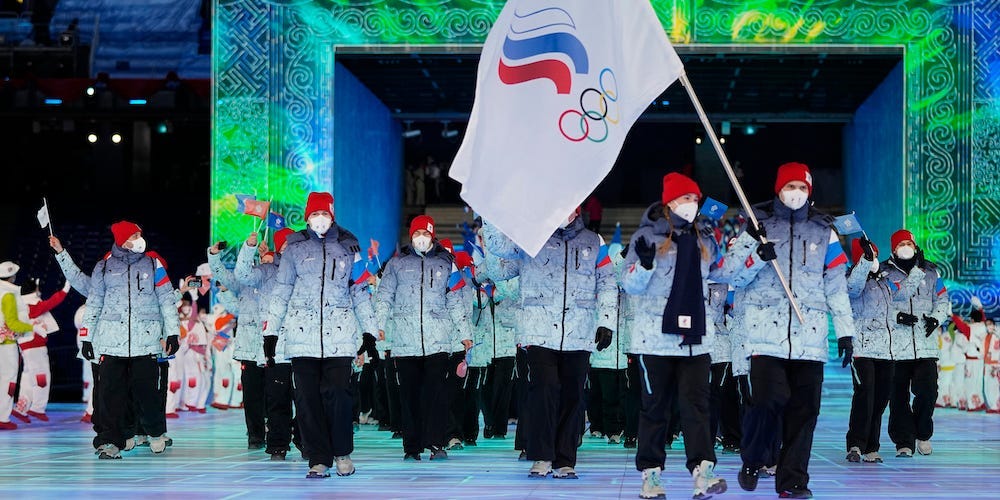- Human rights groups claim that two-thirds of Russia's Olympic athletes are in violation of neutrality rules.
- Russia is banned from competing, but some athletes are allowed to compete under a “neutral” flag.
- According to Global Rights Compliance, 10 of those athletes have voiced support for the Russian military.
At least two-thirds of the Russian athletes due to take part in the Olympics opening in Paris next week are openly flouting neutrality rules over Russia's invasion of Ukraine, human rights groups claim.
Russia and Belarus cannot send teams to the Olympics because of the war, but athletes from both countries can compete as “individual neutral athletes,” or AIN, if they meet certain conditions.
As of July 13, 15 Russian athletes have accepted the invitation to participate as AIN.
The invitation is based on strict rules set out by the International Olympic Committee that prohibit military employment or publicly expressing support for war.
But an extensive document compiled by human rights group Global Rights Compliance and provided to Business Insider found that 10 of the Russian athletes had openly expressed support for the military on social media or through their clubs.
Seven Belarusians were also found to have violated IOC rules.
“The IOC has turned a blind eye to the involvement of athletes from Russia and Belarus who have demonstrated their support for Russia's illegal aggression in Ukraine,” the IOC's president, Wayne Jourdas, said in a statement to BI.
“Not only is this a violation of the UN Charter, but it continues to punish innocent men, women and children of Ukraine every day for war crimes and crimes against humanity,” he added.
The group noted that at least 450 top Ukrainian athletes were killed in the war.
An IOC spokesman did not respond to most of BI's questions, instead giving a blanket statement saying that the organization reviewed all cases in accordance with its guidelines but could not comment further.
Vain neutrality?
In December, the IOC said “strict” eligibility criteria had been set for AIN, which must sign up to the “Olympic Movement's Peace Mission.”
Athletes compete in white uniforms under green flags and stand to the lyric-free national anthem, written specially for the event.
The IOC also said it would conduct background checks on all activities, including social media comments, attendance at pro-war events or displaying pro-war symbols such as the “Z” used by the Russian military.
But Global Rights Compliance, citing open-source research, has identified several Russian and Belarusian athletes who are allegedly in violation.
BI was not able to independently verify all of the group's findings.
Like Russian military “heroes” on Instagram
Tennis player Elena Vesnina, known for her exploits in doubles matches, will compete as AIN in Paris.
However, in March 2022, a verified Instagram account appearing to belong to Vesnina “liked” a post by Russian propagandist Vladimir Solovyov, which praised the “heroism” of three Russian soldiers fighting in Ukraine. In the post, Solovyov called Ukrainians neo-Nazis.
Vesnina is one of seven Russian tennis players who have accepted an invitation to play as an AIN player, four of whom are in violation of neutrality rules, according to Global Rights Compliance.
Vesnina's account also liked a March 2022 post that drew international condemnation after showing a photo of Russian gymnast Ivan Kulyak wearing the letter “Z” on his leotard and standing next to a Ukrainian gymnast.
The person who posted it, former Russian gymnast Alexei Nemov, responded with a comment blasting Kuliak's critics.
Vesnina did not respond to BI's request for comment.
Military ties
The GRC also identified several athletes as members of sports organisations with close ties to the Russian military.
According to the group, some of them are members of Dynamo, the All-Russian Physical Education and Sports Association that aims to improve the combat fitness of security forces, and the Central Sports Club of the Army.
Two of the Belarusian players The group said they were members of the military.
IOC rules state that athletes “may not hold contracts with the military or state security services of Russia or Belarus.”
Global Rights Compliance said it released the document as a “last resort” after the IOC largely ignored its multiple warnings.
The IOC initially responded by saying it took the allegations seriously and that the athletes were “under investigation”, but then they heard nothing from the Olympic committee.

